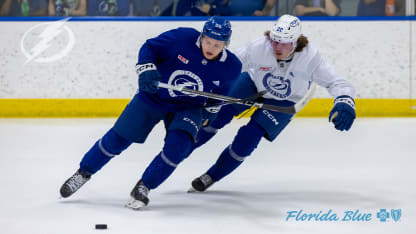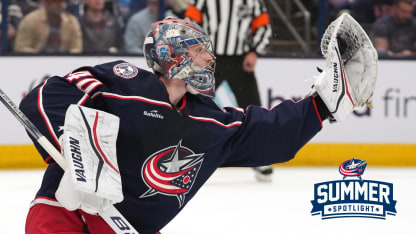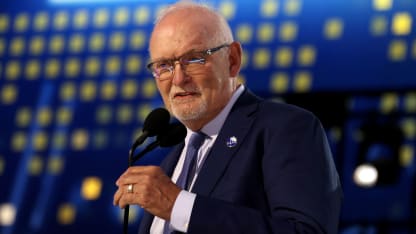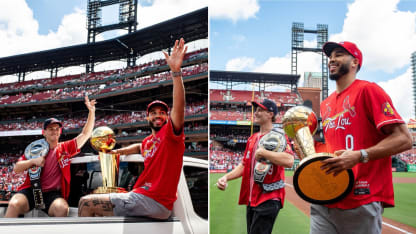Tulsky left career in science on way to becoming new Hurricanes GM
Tulsky left career in science on way to becoming new Hurricanes GM
‘Smartest person in the room’ joined team 10 years ago after working in biotechnology
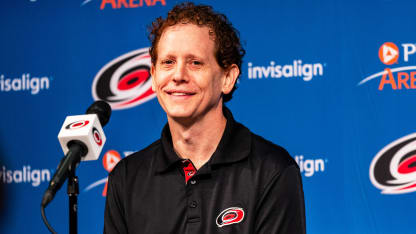
© Josh Lavallee/Carolina Hurricanes
The circumstances of the conversation have faded now, whether it was May or June, mild or hot, whether it was at lunch or after in the parking lot, but the substance is still fresh in the minds of Jason Orach and Eric Tulsky.
There was a choice ahead for Tulsky on that day nearly a decade ago. Ready to move on from his gig at a startup, Tulsky had been offered two jobs: one at Apple, one with the Carolina Hurricanes.
The job at Apple would represent a relatively straightforward path, another step in a career that had taken Tulsky from his Ph.D in chemistry at the University of California, Berkeley through jobs in biotechnology sequencing DNA and jobs at startups working to improve battery energy capacity, a path full of nanomaterials and science.
The job at the Hurricanes was … not that.
It would be a risk, no question, and a departure from everything he had done before, but when the two men talked over the choice, Orach said one thing Tulsky couldn’t ignore.
“He made the point that, ‘This is a once in a lifetime opportunity and maybe it’ll work and maybe it won’t,’” Tulsky recalled. “‘But I promise you won’t be looking back on your life when you’re 70 years old and saying, “Man, I wish I had taken another tech job instead.”’”
Nine years later, Tulsky is the new general manager of the Hurricanes and is firmly implanted in the hockey world, something unimaginable back then, back when he and Orach were just internet dorks inserting data into hockey, back before hiring freelance analysts turned into hiring entire analytics departments, back when the eye test was the only test.
When the Hurricanes made the announcement on June 18 that Tulsky would be their next general manager, replacing Don Waddell on a full-time basis, Orach shot his old friend a text:
“Surreal, dude.”
He continued, “I mean, congratulations and I’m so proud of you. But I don’t think any of us thought in our wildest dreams that that’s where it would end up. So, take the journey.”
* * * *
The journey, in essence, is what Tulsky has been taking his whole career.
It’s not like he set out to major in chemistry or work on solar panels or DNA sequencing or car batteries or, really, hockey.
He set out to solve puzzles.
“When I entered college, my goal was not to think about my career at all, just to study as many things that interested me as I could and not worry about where it took me,” said Tulsky, 49. “And I chose the major I chose because it gave me a lot of flexibility to do a few courses in this field, a few courses in that field, a bunch of electives and really just have a broad base of things that interested me instead of a deep focus in something that was going to be a career because I didn’t know what I wanted to do yet.”
NHL Tonight talks about the offseason for the Canes
By the time Tulsky finished his undergrad degree, in chemistry and physics at Harvard, he still didn’t know. He had spent much of his time immersed in chemistry and was doing well with the subject, so he headed off to graduate school, getting his Ph.D, before becoming a postdoctoral associate at the Naval Research Laboratory.
He still didn’t know what he wanted to do with his life.
“It was basically all about kicking the can down the road for as long as I could until I had to make a decision,” he said.
He opted for biotech, not a place he had seen himself going after studying inorganic chemistry, but the job offered him an interesting project and something to solve. Which, really, was all he truly was seeking.
“I always loved the puzzle aspect of whatever project I was working on and any project [that] had an interesting chemistry puzzle that I needed to bring my understanding and creativity to solve,” he said. “The broader applications that that puzzle was embedded in were not the central thing for me. I wasn’t at a biotech company because I wanted to solve biotech problems. I was at a biotech company because there was an interesting chemistry problem that happened to have biotech applications.”
It’s something that, as friend and former coworker Aram Yang said, is true for many strong researchers.
“[It] isn’t that they necessarily focus on one technical area, it’s that they do like to challenge themselves and they say, ‘OK, here’s a problem. Let’s see if there’s a better way to do it,’” Yang said.
That mentality extended even to his commute.
From the day Tulsky started at QuantumScape in August of 2013, he carpooled to work from Berkeley to San Jose — “45 miles down the worst highway in North America,” as Tulsky put it — with Yang, who lived a few blocks away.
“Even on our day to day, trying to figure out, say, on our commute for example, is there a lane that’s faster than another lane?” said Yang, a senior director at QuantumScape. “Is there a way to game the system a little bit?”
There was.
“There is a stretch of (Interstate) 880 that is a tiny bit faster than the others, but I’m not going to tell you what it is,” Yang said. “We noticed, here’s a spot where it doesn’t make sense to be in the HOV (high-occupancy vehicle) lane, it’s actually faster to go in this other lane. If you look at it, you can realize why, but maybe not everyone would invest the time and energy to make that work.”
Tulsky was just that person.
Each new subject provided a novel, unexplored puzzle to solve, a way to apply his understanding and to come up with a solution.
Hockey, in many ways, was the same. It was also different.
“It’s not a coincidence that I bounced from biotech to solar to displays to electric vehicle batteries to hockey,” Tulsky said. “It’s not that I have passion for all of those. I had passion for hockey — like it is different here and there’s a reason this is the one I stayed in for a decade while I bounced through the other ones.”
* * * *
Hockey had always pulled at Tulsky. He had grown up in Philadelphia, with parents who had season tickets to Major League Baseball’s Phillies, though he gravitated to the Philadelphia Flyers. He became active on Twitter, long before it had become X, and there discovered kindred spirits.
They were a small but dedicated group, a set of people finding each other on a platform that would become far noisier in later years.
“In the early days of Twitter, you could go on and talk about hockey and there weren’t that many people that talked about hockey,” Orach said. “And there certainly weren’t that many people that talked about hockey in a maybe detached or analytical sense.
“There were these certain little pockets of people that were starting to talk about the analytics and all these things that came out of it, Corsi, all of this stuff that people loved to argue about back then. Twitter sort of brought a bunch of those pockets together.”
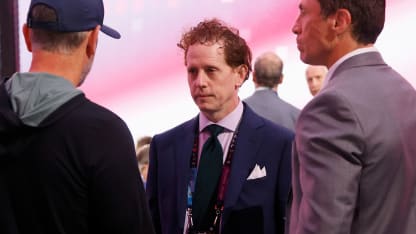
© Bruce Bennett/Getty Images
It started with Tyler Dellow, Vic Ferrari — pseudonym of Tim Barnes, now the director of hockey analytics for the Washington Capitals — and Gabriel Desjardins, among others in a world that also included Sunny Mehta, who just won the Stanley Cup as the Florida Panthers assistant general manager and head of analytics.
Tulsky reveled in it. He entered the blogging world in 2009 or 2010, at first explaining what analysts were doing and what it meant to the hockey world, and then eventually starting to contribute some of his own analysis.
“It was a really neat platform for me because the barrier to entry was so low,” Tulsky said. “You just write something and you put it up and people respond.”
It was, he found, a good training ground for him as a communicator and as a problem-solver, a place where he could learn quickly from the comments section — from either of the two segments of the public who might leave him messages there.
From some, those interested in the data, he would learn the concerns people had, the things he didn’t think about and missed. From others, those uninterested in the data, he would learn how to anticipate their distaste and how to help them see why the numbers were worth talking about.
As Tulsky said, “Whether they were trying to be helpful or not, learning how to interact with them was helpful.”
That was where Orach first found him, posting on SB Nation, taking on increasingly bigger questions. Though some of the group lived in Edmonton, eventually Tulsky, Desjardins and Orach discovered that they lived not far away from each other in the Bay Area. They began making lunch plans, publicly, on Twitter.
“So, we started having lunch together because we’re dorks who like hockey who live near each other in Silicon Valley,” Orach said. “What else do you do? You might as well go have a beer, go have lunch.”
They talked hockey. They talked life.
They bonded over the segment of Twitter that seemed dedicated to shouting them down, yelling at them that “numbers don’t predict the game and they play the games for a reason and this is so stupid and you guys don’t know what you’re doing and you’re like dumb little eggheads,” as Orach put it.
“You’re like, ‘All right, I guess,’” Orach said. “‘You don’t have to read us.’”
They kept on, undeterred.
And not only did Tulsky have ideas. He also had plans. It was a rigorous, scientific way of solving what he was hoping to solve, of proving what he was hoping to prove, something not all that surprising for someone in his line of work.
“He was always sort of a big ideas guy,” said Orach, who is a mechanical engineer in Silicon Valley. “He would say, ‘What if we think about this?’ And we’re kind of like, ‘Huh, wow. Very, very clever.’ I want to say, like genre-shifting ideas. Things that if we could prove them, they’d be really important.
“And then he had enough support that I think he proved enough of them that now he’s doing that in secret [for the Hurricanes].”
Because, yes, eventually hockey itself came calling.
* * * *
It was Darren Yorke, who had joined the Hurricanes in 2010, who first reached out to Tulsky, not long after Ron Francis had been elevated to general manager in Carolina. Yorke, then a video scout/hockey operations assistant, had wanted to change the way the team was approaching data analysis.
The Hurricanes were looking for quarterly consulting work, sketching out a collaboration that, to Tulsky, sounded like a lot more than quarterly reports. They came together, eventually, with a plan.
That plan eventually turned into a full-time offer as a hockey analyst. The offer was accepted.
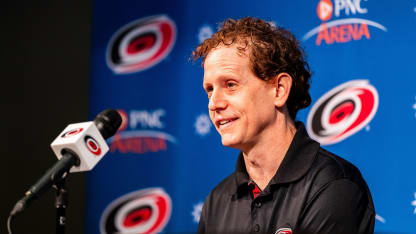
© Josh Lavallee/Carolina Hurricanes
It feels like a long time ago, both in Tulsky’s life and in the way that data has changed in hockey and the way that hockey has changed because of data.
“I think over those 10 years,” Tulsky said, “the kinds of questions that data can answer have evolved and our ability to provide useful answers in more areas and more complete answers in some areas has really taken steps forward.”
The acceptance, too.
“I was in Atlanta for 12 years and it wasn’t even talked about from ’99 to 2011,” Waddell said. “You look at where our game’s come from, now most [teams] have four or five people in the analytics department where you never even thought about having an analytics department.
“I think there’s lots of space to continue to grow because some of the tools that are coming into play through the NHL, with puck tracking and all the things the NHL is doing and things that individual teams are doing, it’s only going continue to grow.
“Analytics can’t drive your decisions, but they can certainly support what you’re seeing and what you’re thinking and certainly be a part of that decision making.”
There is more understanding around the NHL about what data can provide, about how to incorporate it, about its benefits and limitations.
It has become, simply, part of how business is done.
“In every single industry, the initial reaction from people who have been doing it their whole lives without data is to say, ‘I’ve been doing it my whole life without data and I’ve done just fine,’” Tulsky said. “This is a very, very natural reaction and it’s universal.”
But through his 10 years with the Hurricanes, through the NHL’s evolution, Tulsky has seen attitudes change, acceptance grow. He has seen appreciation for the way he solves the puzzles and problems that hockey puts in his way.
The Hurricanes have always been a collaborative organization, making sure everyone’s voices have a place, that ideas are shared and valued. Waddell ensured that, while Tulsky was with the Hurricanes, that he mentored him and tried to help him grow in his thinking, how to deal with issues and, more crucially, how to some up with solutions.
He saw that Tulsky had what it took. He saw how he managed people, how those under him liked and respected him and his work, the ethic that he brought to his job.
“What happens in our business, you’re faced with all kinds of adversity and different problems,” Waddell said. “Some people can handle it and some people can’t handle it maybe all the time. And Eric’s one of those people that you throw something at him, he’s going to figure out what the answer is.
“I think one of the things that rose him to this position was that being a GM, as much it’s got its very highs and peaks, it’s tough sometimes because you’ve got to make tough decisions and sometimes those decisions, I always say, they’re not what the fans want to hear, not what somebody else wants to hear. But you make decisions based on what’s the best for your hockey club and I think Eric’s capable of that.”
And then there was the sheer intelligence.
Waddell called Tulsky “probably the smartest person I’ve ever dealt with. I used to always tell him, ‘You told me once, now tell me in plain English what you just told me.’”
As Hurricanes defenseman Jaccob Slavin said, “He’s just outthinking everybody in the room. He walks in and I think he knows he’s the smartest person in the room, but he doesn’t carry himself that way.”
It’s enough that he — not a former player or a former agent — is now in charge in Carolina.
“I just remember that there was a stereotype when I used to follow baseball more closely of sort of this calculator-carrying — this machine who had no understanding of people — but I think Eric’s maybe best trait is that he is really high-empathy and he understands that it’s not just numbers, these are people,” Yang said.
That was why, when Waddell left the Hurricanes on May 24, hired as the Columbus Blue Jackets GM four days later, Tulsky was elevated to interim GM before getting the full-time position in June.
“I’m 100 percent ready,” Tulsky said. “I am fortunate to have an incredible head coach (Rod Brind’Amour) and an incredible management staff, and so there are a lot of people there to make my job easier. There are a lot of ways in which I don’t need to dramatically change anything. I just need to keep things running the way they have been.
“So, that helps a lot for a first-timer. I am not walking into a place that is broken and needs a huge overhaul. I’m walking into a place that is really running smoothly and just needs a new person helping keep it on the rails.”
Still, when Tulsky got the job this offseason, he was not only faced with multiple player contracts that needed to get done — including those of forwards Martin Necas and Seth Jarvis, with the latter ending up with a unique deferred-payment structure that lowered his average annual value from $7.9 million to $7.5 million on an eight-year deal — but about 80 percent of the Hurricanes’ staff contracts were up.
There was not much downtime.
There was also an assistant general manager spot to fill.
And there, he dipped back into his old well, the group that had found each other on Twitter in those early days, one of the first of the crop of analytics hires back in 2014 and 2015. In addition to elevating Yorke from assistant GM to associate GM, Tulsky hired Dellow, who was the New Jersey Devils senior vice president of hockey strategy and analytics, as the Hurricanes’ new assistant GM.
It just made sense.
“He’s a numbers guy first and foremost and he’s making all of us look good,” Orach said of Tulsky. “He’s very thoughtful, he’s very hardworking, he’s such a nice guy that you’re just happy for him, just thrilled that he did take that risk, that he did take that gamble and, certainly, that the Hurricanes took that gamble on him and it just worked out, it seems like.
“He’s very, very clever. And I wish he was in charge of my favorite NHL team.”

